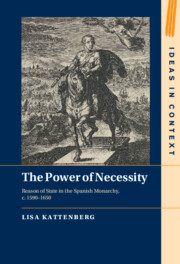15 results
Conclusion
-
- Book:
- The Power of Necessity
- Published online:
- 22 December 2022
- Print publication:
- 05 January 2023, pp 238-246
-
- Chapter
- Export citation
Chapter 4 - Experience, Conscience and Necessity
-
- Book:
- The Power of Necessity
- Published online:
- 22 December 2022
- Print publication:
- 05 January 2023, pp 180-237
-
- Chapter
- Export citation
Index
-
- Book:
- The Power of Necessity
- Published online:
- 22 December 2022
- Print publication:
- 05 January 2023, pp 276-282
-
- Chapter
- Export citation
Dedication
-
- Book:
- The Power of Necessity
- Published online:
- 22 December 2022
- Print publication:
- 05 January 2023, pp v-vi
-
- Chapter
- Export citation
Contents
-
- Book:
- The Power of Necessity
- Published online:
- 22 December 2022
- Print publication:
- 05 January 2023, pp vii-viii
-
- Chapter
- Export citation
Bibliography
-
- Book:
- The Power of Necessity
- Published online:
- 22 December 2022
- Print publication:
- 05 January 2023, pp 247-275
-
- Chapter
- Export citation
Figures
-
- Book:
- The Power of Necessity
- Published online:
- 22 December 2022
- Print publication:
- 05 January 2023, pp ix-ix
-
- Chapter
- Export citation
Chapter 3 - Virgilio Malvezzi and the Mosaics of Morality and Necessity
-
- Book:
- The Power of Necessity
- Published online:
- 22 December 2022
- Print publication:
- 05 January 2023, pp 127-179
-
- Chapter
- Export citation
Copyright page
-
- Book:
- The Power of Necessity
- Published online:
- 22 December 2022
- Print publication:
- 05 January 2023, pp iv-iv
-
- Chapter
- Export citation
Acknowledgements
-
- Book:
- The Power of Necessity
- Published online:
- 22 December 2022
- Print publication:
- 05 January 2023, pp xi-xiv
-
- Chapter
- Export citation
Chapter 2 - ‘The Inexhaustible Ocean of Politics’
-
- Book:
- The Power of Necessity
- Published online:
- 22 December 2022
- Print publication:
- 05 January 2023, pp 79-126
-
- Chapter
- Export citation
Introduction
-
- Book:
- The Power of Necessity
- Published online:
- 22 December 2022
- Print publication:
- 05 January 2023, pp 1-29
-
- Chapter
- Export citation
Tables
-
- Book:
- The Power of Necessity
- Published online:
- 22 December 2022
- Print publication:
- 05 January 2023, pp x-x
-
- Chapter
- Export citation
Chapter 1 - Necessity and Counter-Reformation Reason of State
-
- Book:
- The Power of Necessity
- Published online:
- 22 December 2022
- Print publication:
- 05 January 2023, pp 30-78
-
- Chapter
- Export citation

The Power of Necessity
- Reason of State in the Spanish Monarchy, c. 1590–1650
-
- Published online:
- 22 December 2022
- Print publication:
- 05 January 2023



